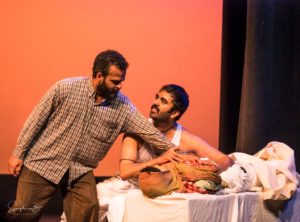 ARCHNA ASHTANA
ARCHNA ASHTANA
In the 5th presentation of Naatak’s Mela at the Cubberly Community Theater this month, four plays, under the umbrella of “dark tales of desire” hit the solar plexus with a punch. The audience was pushed into a “discomfort zone” and forced to hold up a mirror to the human condition surrounding us. Unlike previous times where a variety of genre and languages were offered, this year it was English and Hindi and focused on a single theme somewhat limiting the repertoire expected in a mélange.
Tales of desire, lust, depravity, and morally reprehensible behavior in some form or another made the audience gasp and squirm and tore through the moral fabric of society.It was encouraging to see Naatak promoting homegrown talent, alongside stalwarts of South Asian literature who have faced the conservative wrath for exposing taboo subjects. Through effective and unapologetic storytelling in an abbreviated time span, each play exhibited dexterity, sophistication and sensibilities when dealing with such distressing topics.

Ismat Chugtai’s “Lihaaf” told the story of desire of a neglected Begum satiated in a different way, unknowingly witnessed by a young, innocent girl. The lihaaf (quilt) becomes the symbol of her nightmares as she recalls the undulating, gyrating shadow she wakes up to in Begum Jaan’s chambers, and unwittingly is drawn into the play of seduction. Preeti Bhat as the long suffering Begum convincingly emotes her frustrations and fulfillment without stirring from the bed. Unique shadow dancing enhances the unfolding saga; while the young and adult versions of the girl together on stage add to the depth and complexity.
“Shmashaan” wowed and shook the conscience while exposing human basal instincts, as two young men (Rohit Dube and Snehal Pachigar) go about their professional duties as domes (workers at a Benaras creamation ghat). In the midst of the final reality of human existence, devoid of any frills, necrophilic passions can arise for want of a natural outlet. Anush Moorthy writes and directs with sensitivity in exploring unmet desires of the married friend who consummates the marriage in a socially unforgivable way; while the unmarried friend buys his pleasures.
“The Confession” is a tale by Vikram Ramanarayanan loosely based on true events of sexual oppression by men of cloth. Female empowerment dominates this tale as it outlines the sordid goings on of a bishop, who, eventually is exposed for the predator he is. At the same time, it highlights with humor the moral predicament of a pastor when a young wife, dissatisfied with her marital situation, expresses her love for him.
 Sadat Manto’s controversial “Khol Do” is treated with disarming frankness and honesty as the stark reality of men in power destroys those they profess to protect. The backdrop of the barbaric India-Pakistan partition provokes strong emotions creating a taut situation when viewed through the lens of recent real life abuse in the “Nirbhaya” case.
Sadat Manto’s controversial “Khol Do” is treated with disarming frankness and honesty as the stark reality of men in power destroys those they profess to protect. The backdrop of the barbaric India-Pakistan partition provokes strong emotions creating a taut situation when viewed through the lens of recent real life abuse in the “Nirbhaya” case.
The entire production team, especially the lights department, set the mood with the changing hues, and stole the show as the most visual prop on stage.







